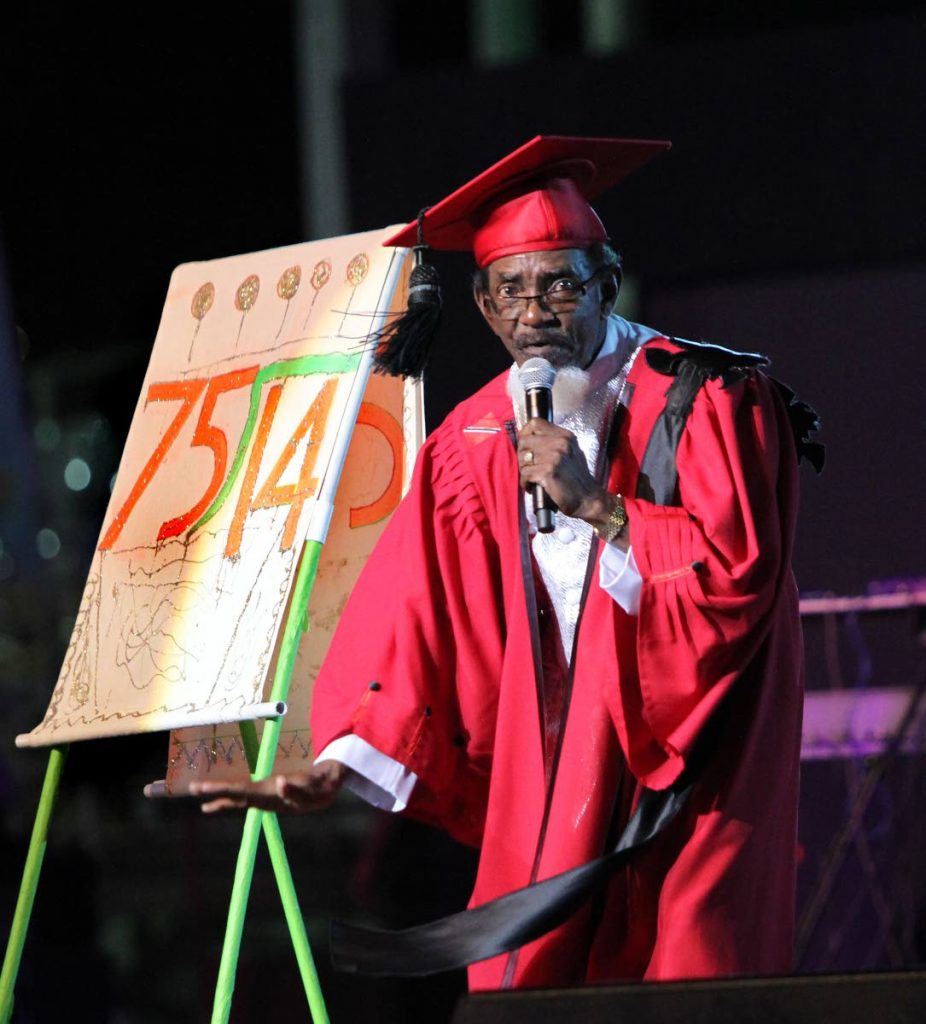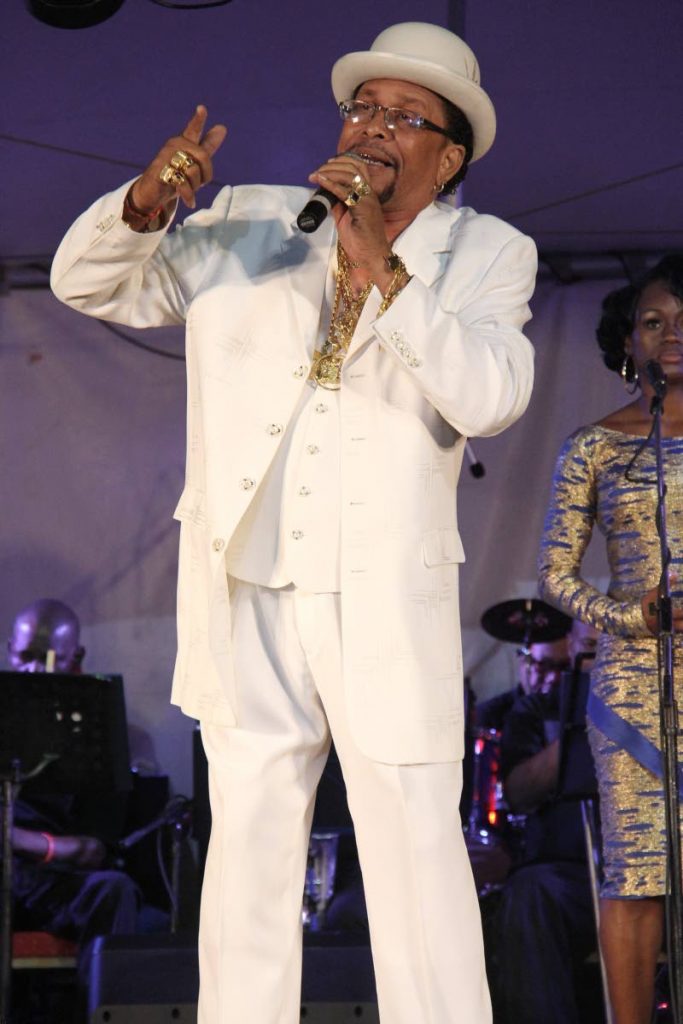The great calypso debate...again

The controversy surrounding Nermal “Massive” Gosein’s song, Rowlee Mudda Count, has raised fresh debate about what constitutes a good calypso.
And while some calypsonians argue that politicians have historically taken a beating in the artform and that many people still do not understand calypso, others contend exponents must be guided by their consciences with respect to material that could be considered distasteful or offensive.
The public’s criticism of Gosein’s tune culminated in a decision by the Telecommunications Authority of Trinidad and Tobago (TATT), on Friday, to prevent it from being played on the airwaves.
In a letter to Trinidad and Tobago Publishers and Broadcasters Association (TTPBA) president Daren Lee Sing, TATT CEO Dr John Prince said the song was highly derogatory to women and called on the association to avoid breaching Clause D9 of the concession granted to broadcasters.
This states that “the concessionaire shall not transmit any programme, information or other material which degrades or portrays in a negative manner or discriminates against or encourages discrimination against any person or group by reason of race, origin, class, religion or sex.”
The authority said statements in the song “can prove to be inappropriate and derogatory to mother figures who play an important role in the enrichment and development of our society.”
Gosein has since accused the Dr Keith Rowley-led administration of political interference.
TATT’s move is likely to set a new precedent in the industry. The TTPBA has said it would meet this week to discuss the issue.
Veteran calypsonian Michael Osuna, better known as Sugar Aloes, believes that while jabs at politicians in calypso is not a new phenomenon, calypsonians must exercise responsibility in their content.
“I think everybody has a responsibility that they are supposed to adhere to and hold the path where respect is concerned regardless of what,” he said in a Sunday Newsday interview.
“Conscience has a lot to do with it, because there is a point I would not go beyond. And everybody should have that instinct.”
Osuna said this was one of the reasons why he has taken a conscious decision not to sing political songs over the years.
“The country is, too much, in a disarray now. We eh have time for that.”
NINE-DAY WONDER
Saying he could not understand the controversy surrounding the song, Osuna brushed it off as a nine-day wonder.
He said: “Sometimes, this thing is like a pimple. If a pimple come up on your face and you leave it alone, it will go away. But, if you take a dirty fingernail and you squeeze it, you end up with an abscess. This is what is being treated to this particular guy and his composition.”
Osuna, manager of the Revue, made it clear he has no opinion on Gosein’s song.
“If the fella like he song, he like he song. I can’t have no opinion on he song. And, if he feel comfortable singing it, what can I say?”
However, he observed that the furore over the selection reminded him of the feedback he, too, received to some his own contributions over the years.

“There is a fine line for those who want to draw references to me,” he said
Unlike Gosein’s Rowlee Mudda Count, Osuna said, his songs are based on things he has seen with his own eyes.
“I remember seeing Oma Panday (wife of former prime minister Basdeo Panday) standing up and booing Jimmy Singh. I also remember her on the front page sitting down on (Evander) Holyfield’s lap. These were the things I referred to.”
Osuna said there also was a race component to the controversy.
He recalled that many East Indians had stopped coming to the tents “when we started taking shots at them.
“Had God made it that there was never an Indian prime minister, that would not be so because what would have been attacked was the party and its leader, which is the same thing Massive Gosein doing now.”
Even so, Osuna said every prime minister, regardless of race, has received blows.
“There is no across-the-board standard. What is good for the goose is good for the gander. If it was good then, it have to be good now.”
He said the people protesting were also the ones lapping up the calypsoes “and then when the shoe on the next foot, prejudice explodes.”
Asked if the controversy surrounding Gosein’s song was hypocritical, Osuna said: “To put it lightly, yes. But you have to be careful, because you walking on egg shells these days, especially those who depending on the Government for little funds, like the Revue and Icons.”
CHALKIE: ROWLEE SONG DISTASTEFUL
For nine-time monarch Dr Hollis Liverpool (Chalkdust), said many people still don’t understand calypso.
However, he said the issue was one of taste.
“Gosein’s song is distasteful. In my whole career, I have never sung nor will I ever sing a calypso like that. People have to learn how to compose.”
Liverpool dismissed media reports which suggested he had attacked Persad-Bissessar and East Indians, when she was prime minister.
“I ever attack Mrs Persad-Bissessar and Indian people? I attack people, whether is Indian, African. Look how many songs I have sung about Eric Williams. I don’t sing in race, I sing about events.”
Historian Prof Emeritus Bridget Brereton said Rowlee Mudda Count was a disgusting song.
“I have not heard it. I have only read the lyrics in the papers. But from reading the lyrics, it seems a pretty disgusting song,” she said.
However, Brereton said it was “completely futile” to attempt to censor calypso or chutney.
“There is just no point in trying to do that because calypso, and chutney to some extent, has a long, ancient tradition of being distasteful and downright rude and coarse. That is a part of its tradition.”
She said the public must decide if they want to listen to the song or not.
“I don’t think any censorship is a good idea at all.”
NOTHING TO TALK ABOUT
Curtis Conyette, who goes by the sobriquet Dirty Curty, said the furore over Rowlee Mudda Count, was not worth talking about.
“In my opinion, Massive eh have no ideas and it’s nothing to talk about,” said Conyette, an executive member of the Kaiso Karavan.
“He say they making it a racial thing but when Crazy (Edwin Ayoung) sing Paul, Yuh Mudda Come, they ban it. But it was popular all over the place.”
Conyette said calypsonians have long pushed the boundaries in their offerings, so much so that some of them were forced to modify their lyrics.
He recalled that Super Blue (Austin Lyons) had to change some of the lyrics in his hit Soca Baptist after he had initially referred to “Baptist women wining.”
“We so deceitful. He had to change the line, ‘If you see Baptist women wine,’ because Baptist women don’t wine.”
Conyette said over the years, race and politics have led people to become very thin-skinned.
He recalled when Sugar Aloes sang She’s Royal to former prime minister Kamla Persad-Bissessar on a UNC platform, the response from PNM supporters was that “he sell out.”
“But you don’t have to like the people. They paying you to sing and now Aloes has been ostracised along with De Fosto (Winston Scarborough) and Crazy.
“As soon as you sing anti-PNM, you could get away with singing it. But once you climb on a platform, you in trouble.”
Conyette said the outcry over the song was simply because “Is PNM time now.”
“I am a kaisonian and I sing on everybody.”
Conyette said he would not be surprised if Gosein made it to the semifinals of the National Calypso Monarch competition at Skinner Park, San Fernando.
“So, he will get a PNM Skinner Park baptism with toilet paper.”
Gosein, who is set to participate in the Chutney Soca Monarch competition, also has signalled his intention to contest the National Calypso Monarch competition.
Conyette regarded Gosein’s song as simple.
“It would not have meant anything if people shut up. They make it a controversy.”

Comments
"The great calypso debate…again"